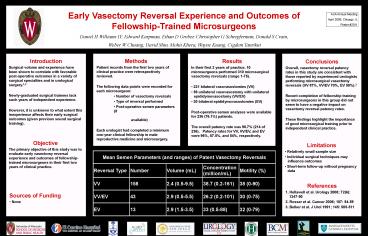Vit. D - PowerPoint PPT Presentation
1 / 1
Title:
Vit. D
Description:
Early Vasectomy Reversal Experience and Outcomes of Fellowship-Trained Microsurgeons Daniel H Williams IV, Edward Karpman, Ethan D Grober, Christopher G Schrepferman ... – PowerPoint PPT presentation
Number of Views:43
Avg rating:3.0/5.0
Title: Vit. D
1
Early Vasectomy Reversal Experience and Outcomes
of Fellowship-Trained Microsurgeons Daniel H
Williams IV, Edward Karpman, Ethan D Grober,
Christopher G Schrepferman, Donald S Crain,
Weber W Chuang, David Shin, Mohit Khera, Wayne
Kuang, Cigdem Tanrikut
AUA Annual Meeting April 2009, Chicago, IL Poster
2011
- Methods
- Patient records from the first two years of
clinical practice were retrospectively reviewed. - The following data points were recorded for each
microsurgeon - Number of vasectomy reversals
- Type of reversal performed
- Post-operative semen parameters (if
available) - Each urologist had completed a minimum one-year
clinical fellowship in male reproductive medicine
and microsurgery.
- Introduction
- Surgical volume and experience have been shown to
correlate with favorable post-operative outcomes
in a variety of surgical specialties and in
urological surgery.1,2 - Newly-graduated surgical trainees lack such years
of independent experience. - However, it is unknown to what extent this
inexperience affects their early surgical
outcomes (given previous sound surgical
training).
- Results
- In their first 2 years of practice, 10
microsurgeons performed 310 microsurgical
vasectomy reversals (range 1-75). - 221 bilateral vasovasostomies (VV)
- 59 unilateral vasovasostomy with unilateral
epididymovasostomy (VV/EV) - 30 bilateral epididymovasostomies (EV)
- Post-operative semen analyses were available for
236 (76.1) patients. - The overall patency rate was 90.7 (214 of 236).
Patency rates for VV, VV/EV, and EV were 96,
87.5, and 54, respectively.
Conclusions Overall, vasectomy reversal patency
rates in this study are consistent with those
reported by experienced urologists performing
microsurgical vasectomy reversals (VV 87, VV/EV
70, EV 50).3 Recent completion of fellowship
training by microsurgeons in this group did not
seem to have a negative impact on vasectomy
reversal patency rates. These findings
highlight the importance of good microsurgical
training prior to independent clinical practice.
- Objective
- The primary objective of this study was to
evaluate early vasectomy reversal experience and
outcomes of fellowship-trained microsurgeons in
their first two years of clinical practice.
- Limitations
- Relatively small sample size
- Individual surgical techniques may influence
outcomes - Short-term follow-up without pregnancy data
Mean Semen Parameters (and ranges) of Patent Vasectomy Reversals Mean Semen Parameters (and ranges) of Patent Vasectomy Reversals Mean Semen Parameters (and ranges) of Patent Vasectomy Reversals Mean Semen Parameters (and ranges) of Patent Vasectomy Reversals Mean Semen Parameters (and ranges) of Patent Vasectomy Reversals
Reversal Type Number Volume (mL) Concentration (million/mL) Motility ()
VV 158 2.4 (0.5-9.5) 38.7 (0.2-161) 38 (0-90)
VV/EV 43 2.9 (0.5-5.5) 26.2 (0.2-101) 30 (0-75)
EV 13 2.9 (1.5-3.5) 33 (0.5-88) 32 (0-79)
- References
- Hellawell et al. Urology 2008 72(6) 1347-50
- Rosser et al. Cancer 2006 107 54-59
- Belker et al. J Urol 1991 145 505-511
3
- Sources of Funding
- None































